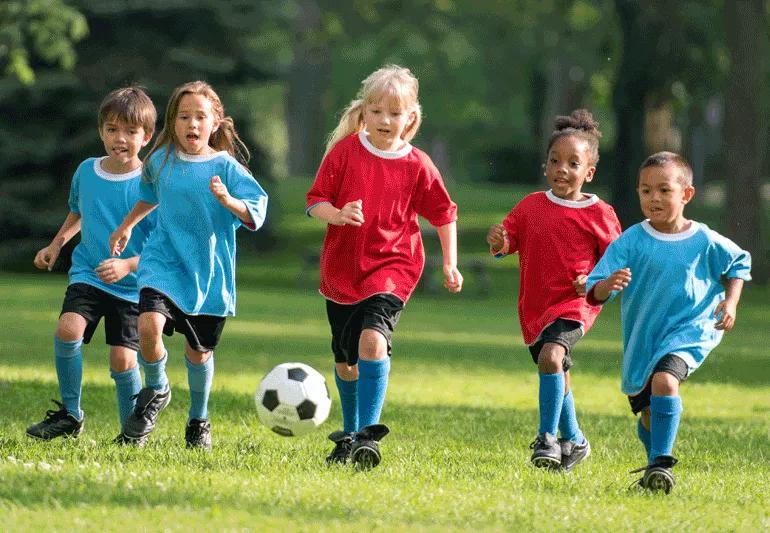Participating in sports teaches kids life skills and can build self-confidence for the long haul

Sure, your kid enjoys T-ball (or soccer or youth basketball or swim team). But aside from making friends and getting out all that extra energy, could their athletic pursuits also be improving their mental health?
Advertisement
Cleveland Clinic is a non-profit academic medical center. Advertising on our site helps support our mission. We do not endorse non-Cleveland Clinic products or services. Policy
“One of the obvious benefits of sports is increased physical activity, especially in an age of so much screen time,” says health and sport/performance psychologist Matthew Sacco, PhD, “but there are a lot of social and emotional benefits as well.”
Dr. Sacco explains how participating in team sports could set your child up for big wins in life, both now and as they grow up.
Team sports help kids learn how to better interact with their peers. If your child is struggling with emotional regulation or interacting with others, the structured setting of team sports can help create a safe environment to learn important social skills.
“When kids participate in cooperative play, they have to figure out how to solve problems, how to work together and sometimes, how to manage the frustrations that come with people not doing what you want them to do,” Dr. Sacco says.
These skills translate into every aspect of life, from school to the office and beyond, so learning them in childhood can lead to more positive experiences and interactions in the future.
Sports are also just a great way to meet new people. “If your child is a little quiet or even new in school, joining a sport can be a great way to make new friends and get to know other kids their age,” he adds.
Advertisement
Working together toward a common goal (for example, winning a game or a match) arms kids with lifelong skills like how to lead and to follow, as well as to negotiate with others. As every adult who’s ever had to interact with another human being knows, these are critical skills to have — and not everyone does.
“It can be really difficult to teach these skills in other settings,” Dr. Sacco notes. “They happen in school, too, but the quick, active nature of sports provides an environment that is more free-flowing and less structured than a classroom.”
Kids need both structured and unstructured time for play, both of which contribute differently to their development. When a child joins a team sport, they learn to stick to a reliable schedule.
“Sports provides a very structured environment where they know, predictably, what’s going to come next, in terms of practices and game schedules,” Dr. Sacco says. “These are all opportunities for kids to practice consistency.”
Building traits like persistence and reliability have lasting benefits that will serve kids later in life.
Every teammate has a specific position and role to play. “When everyone has a responsibility, kids learn to rely on others for their particular strengths and skills,” Dr. Sacco explains.
Plus, if your child is shy or struggling with self-confidence, participating in a team sport can provide an opportunity for them to start feeling good about themselves.
“It can bring a kid out of their shell to have people rooting for them and trying to integrate them into a team,” he adds.
Bad experiences in childhood can stick with you for life — but research shows that playing sports could have a long-lasting positive impact on mental health for kids who are going through difficult times at home, including abuse, parental separation and household substance abuse.
A 2019 study suggested that engaging in team sports may help kids fend off depression. Data on 9,668 children found that, among the children who were exposed to adverse childhood experiences, those who participated in team sports reported better mental health in adulthood. These children, as they got older, didn’t get as depressed as often as kids who weren’t engaged in group activities or sports.
“We know that physical activity has a positive effect on mood and anxiety,” Dr. Sacco confirms, “but being part of a team, in particular, can also lead to improved mental health outcomes. They can help kids feel connected, feel heard and feel like they have strong support systems in hard times.”
Advertisement
As a parent or caregiver, you want your child to have a positive experience playing a sport (or doing anything else, really). Dr. Sacco says there are steps you can take to try to set them up for social and emotional success.
Worried that your child will want to quit halfway through the season? The right time to have that conversation is actually before they start playing.
“Make sure your child knows up front what the expectations are,” Dr. Sacco advises. “Tell them, ‘If you want to do this, it’s going to be a commitment, and it will last for X amount of time.‘ That gives you a little bit of leverage down the road if your kid tries to quit mid-season.”
Another way to make a long commitment more palatable for little kids is to shorten the length of the commitment itself.
“Your local community centers may offer short sports seasons,” Dr. Sacco suggests. “For example, a summer baseball or softball league might be a six- to eight-week commitment, rather than a longer time commitment during the school year.”
This lets kids start out in a lower-pressure environment where they can explore their interests, develop their skills and stamina, and ultimately decide whether the sport is a good fit for them. Then, if they want to continue playing, you can look into longer-term options.
Advertisement
If you grew up playing soccer and have always dreamed of cheering for your own kiddo from the side of the field, you may have to adjust your expectations when it turns out that your mini-me actually prefers basketball … or baseball … or, wait, maybe volleyball?
“Your child might need to try a few different sports for short durations before they find one they want to commit to,” Dr. Sacco says. And that’s OK! Give kids the freedom to try the sports that interest them and to change course if they decide they want to switch to something else.
“Read the room, see how they’re doing, and if something isn’t working for them, consider moving on to something else,” he advises. “Leaving a sport that’s just not their thing allows them to find a sport down the road that does work for them.”
If your child comes to you desperate to quit, it’s important to try to understand why. Maybe they’re never in the mood to practice but they always come home smiling and happy (we’ve all been there). But maybe there are true red flags, like bullying from teammates or issues with an angry coach.
“Make those observations and check in with your child to try to figure out what’s going on,” Dr. Sacco says. “Then, you can help them address and solve those problems just as you would issues at school.”
Advertisement
As a parent, Dr. Sacco says you should be playing the long game — that is, figuring out how to help your child find an activity they love, not forcing them into a miserable experience just for the sake of it.
“If you push them to slog through it, you may ruin the idea of that sport, or of sports altogether, which could come back to bite you,” he cautions. “Your child may not attempt another activity in the future, simply because they know that if they hate it, they’re going to be stuck with it.”
Remember the phrase, “It’s not whether you win or lose, it’s how you play the game”? As an adult, you may think that sports are all about competition — but for little ones, that old adage is actually true.
“Younger kids’ sports should really revolve around the goal of ensuring that, by the end of the season, every kid who on the team wants to play again the next season,” Dr. Sacco says.
That means that in the beginning, at least, sports really shouldn’t be all about winning or even about separating the good players from the … well, less-good players.
“The reality is that most of these kids aren’t going to become high-level athletes,” Dr. Sacco concedes. “For them, sports should be about having fun and being active. And the onus is on the adults to make sure things don’t become too negative or competitive.”
If your kid has tried every sport under the sun and nothing is sticking (or if they simply show no interest in sports to begin with), never fear. Other group activities can have similar benefits, no love of the game required.
“Kids can still gain social skills and leadership skills from other activities, like going to theater camp, joining Scouts or playing in the school bands,” Dr. Sacco points out. “It doesn’t necessarily have to be sport or even a physical activity.”
Whatever your child’s activity of choice, that team setting is the key. It gives kids opportunities to engage with their peers, hone their people skills and learn to work together toward common goals.
“Most kids just want to go out there, have fun and play with their friends,” Dr. Sacco says. “As grownups, that’s what our goals for them should be.”

Sign up for our Health Essentials emails for expert guidance on nutrition, fitness, sleep, skin care and more.
Learn more about our editorial process.
Advertisement

Swimming is an essential life skill — kids should start learning to swim by age 4

Build breaks into training routines to prevent the wear and tear behind repetitive stress

Let your little one’s enthusiasm and motivation fuel their interest in running, but don’t pile on miles too early

Protective equipment like sports cups can help avoid injury

It depends on how sick they were

An annual exam looking at heart health

Follow guidelines to limit pitches, rest between games

When baby teeth get damaged, these procedures can relieve pain and save space for adult teeth

Even small moments of time outdoors can help reduce stress, boost mood and restore a sense of calm

A correct prescription helps your eyes see clearly — but as natural changes occur, you may need stronger or different eyeglasses

Both are medical emergencies, but they are very distinct events with different causes